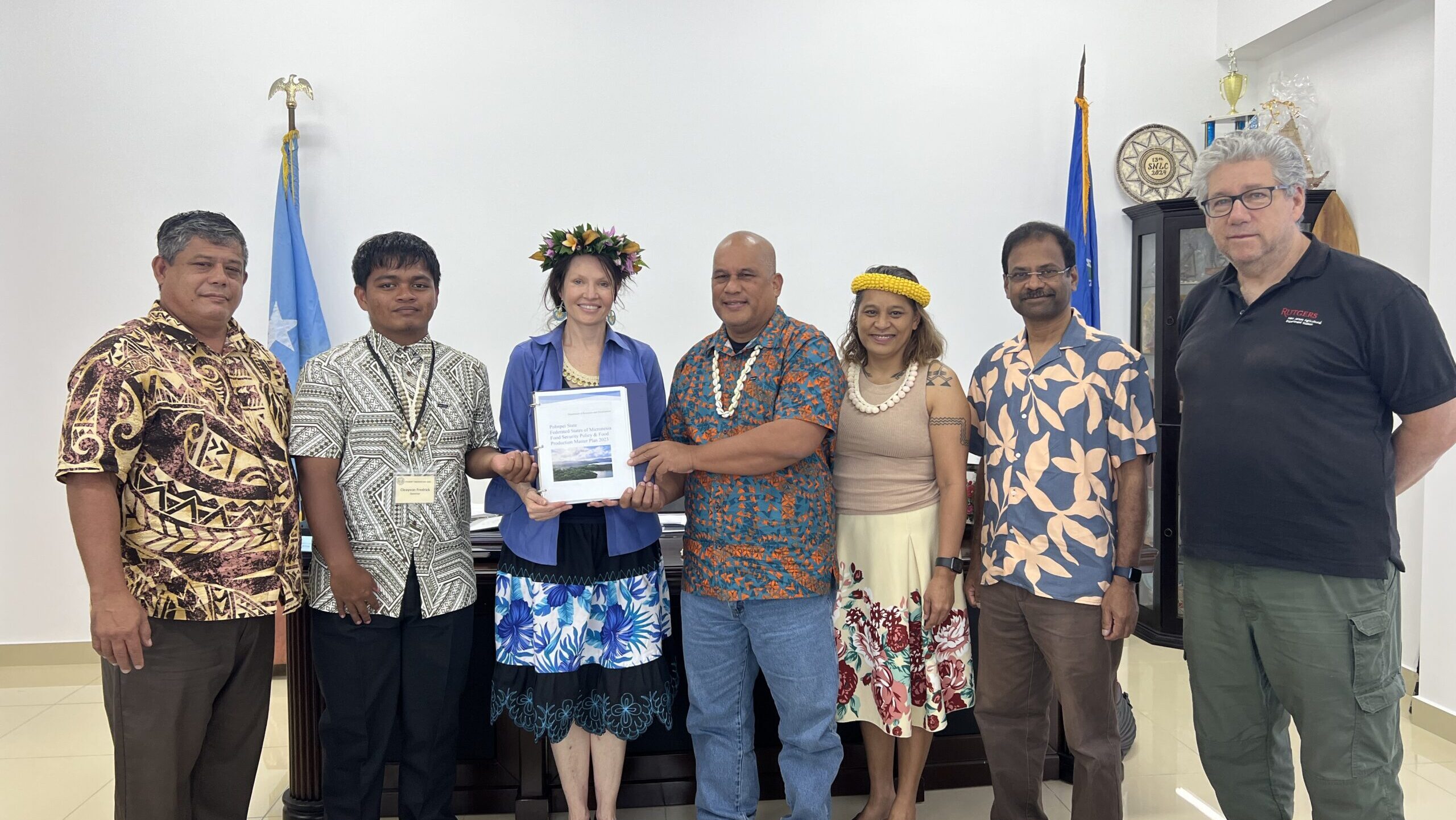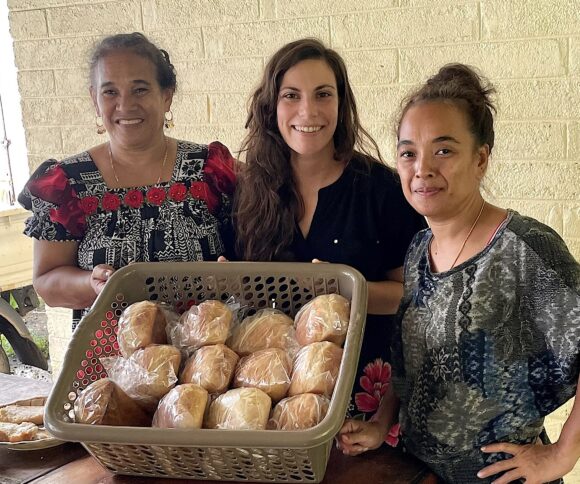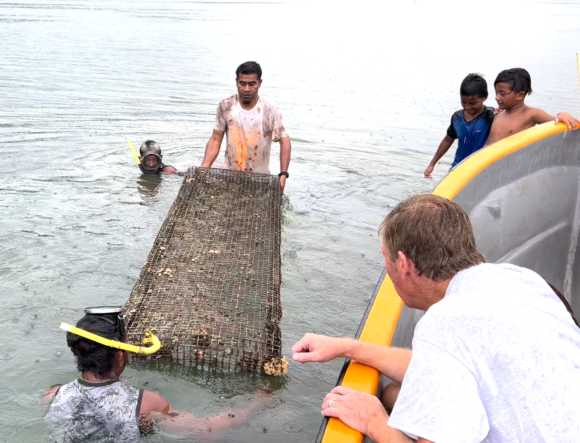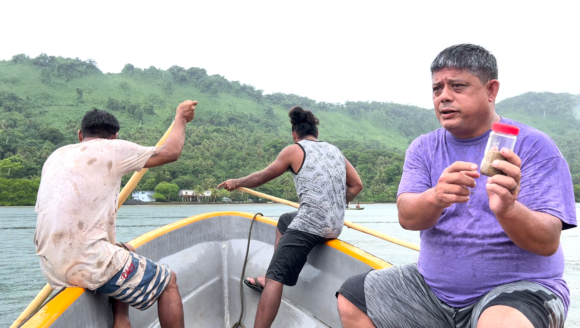
Rutgers scientists Dena Seidel (third from left), Ramu Govindasamy (second from right) and James Simon (at right) are pictured with Governor Stevenson Joseph (center) and Pohnpei officials for the release of the Pohnpei State Food Security Policy in February 2025.
The expansive Pacific Island nation of the Federated States of Micronesia (FSM) is taking bold steps to develop sustainable local food production with support from an interdisciplinary food system science team from the Rutgers School of Environmental and Biological Sciences.
Pohnpei State is home to FSM’s most biodiverse ecosystems that includes many endemic species and unique terrestrial, coastal and ocean environments. With fertile land and abundant fresh water, Pohnpei state is considered well suited for the sustainable development of local agriculture and aquaculture to enhance food security, economic growth, and reduced dependence on imported foods. Pohnpei’s Governor Stevenson A. Joseph recently announced the official endorsement and release of the Pohnpei State Food Security Policy, a groundbreaking initiative that will guide the state toward a more resilient and self-sustaining food system. This policy, developed in collaboration with Rutgers scientists and researchers over the last five years, is the first of its kind in the Federated States of Micronesia.

In 2023, Rutgers graduate student Lara Brindisi (center) is pictured in Pohnpei with Emihner Johnson (left) of the Island Food Community and a colleague.
Rutgers scientists began working with Pohnpei State on this food security policy back in 2020. Dena Seidel, an honorary Ambassador-at-Large for Pohnpei State, had been tasked by then Governor Reed Oliver to assist with the development of a food security policy as central to the state’s effort to tackle food insecurity. A SEBS visiting scholar at the time, Seidel reached out to Jim Simon, Distinguished Professor of Plant Biology, to discuss this opportunity. Simon, who has spent decades supporting sustainable development projects in Africa and Central America with Ramu Govindasamy, professor in the Department of Agricultural and Food Resource Economics, was excited at the chance to apply agriculture science toward food security policy. Soon a Rutgers food system science team was formed that also included Oscar Schofield, professor and chair of the Department of Marine and Coastal Sciences, and Mike Balick, ethnobotanist from the New York Botanical Gardens, among others.
For the past five years, the Rutgers science team has been working in close partnership with Pohnpei State’s Directors of Resources and Development, Hubert Yamada and Mark Kostka and their teams. Building upon prior surveys and previous reports, the Pohnpei State Food Security policy evolved into incorporating new data from the Rutgers’ led Green Climate Fund Baseline Assessment of Climate Change Impact on FSM Farming Families. Using a participatory approach and a community-based food system development framework, the Pohnpei State Food Security Policy is now recognized as representing the voices of the Pohnpei people and their food system development goals and aspirations.
In February 2025, Governor Joseph reaffirmed his administration’s commitment to implementing the Food Production Master Plan 2025 and achieving the ambitious goal of increasing local food production by 50 percent within the next five years.

Oscar Schofield (at right) is pictured in 2022 viewing an aquaculture pilot project in Pohnpei, Micronesia.
“Pohnpei State has enormous potential to strengthen our economy, improve our overall health and nutrition, and build upon our culture through the production of local food. This Food Security Policy serves as a living document to guide us as we take urgent, targeted steps to strengthen our local food system. There is much we can do together to incentivize and stimulate local food production for the benefit of our people,” said Governor Joseph.
“It’s very meaningful to be part of a science team invited to co-create food security policy in the Federated State of Micronesia. Food system development is inherently interdisciplinary, and I am grateful that at Rutgers we have such a wide variety of scientists who are interested and passionate about applying their skills toward the greater good,” said Simon.
Additional scientists, researchers and graduate students that contributed to this policy include Lara Brindisi and Erik Gomes (Plant Biology), Daniel Hoffman, (Nutritional Sciences), Ethan Schoolman (Sociology) Mark Robson, Distinguished Professor of Public Health, and Michael De Luca (Jacques Cousteau National Estuarine Research Reserve) as well as Rutgers students Micah Seidel, Nisha Khanna, Tori Rosen and Erin Quinn. Micronesian food system development partners that contributed to the policy include Engly Ioanis and Manoj Nair (Ph.D) from the College of Micronesia Land-Grant, and Saimon Mix and Emihner Johnson of the Island Food Community.

Pohnpei State Director of R&D Mark Kostka is pictured in 2022 sharing about an aquaculture pilot project with the Rutgers team.
The official endorsement of the Pohnpei State’s Food Security Policy was recently announced on the Governor’s website to support the state’s goals for local food system development with emphasis on strengthening local food production to provide economic opportunities and increased health and well-being for all Pohnpeians.
The Rutgers food system science team working in support of the FSM continues to grow and is now working on their 5th project in support of the nation’s food security goals with collaborative support from Rutgers scientists AJ Both and James Shope (Environmental Sciences), Dave Bushek and Roland Hagan (Marine and Coastal Sciences) and Yariv Ben Naim (Plant Biology).

